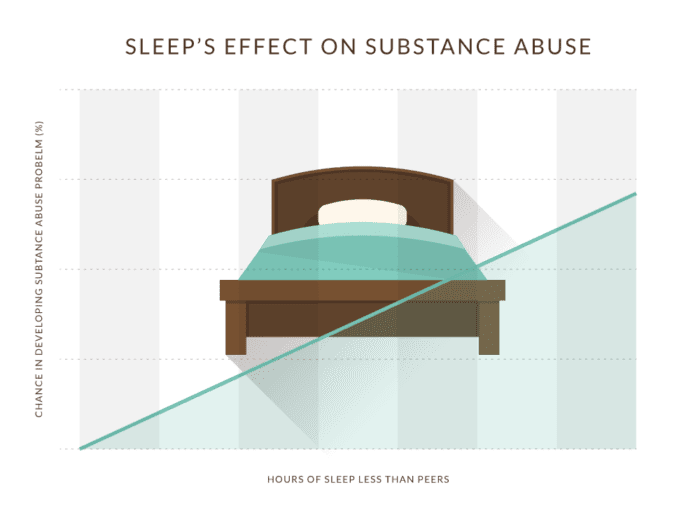One of the most intriguing — and significant — questions surrounding the issue of addiction has to do with susceptibility. What is it, exactly, that makes one person more likely to become addicted to alcohol or drugs than another person?
It’s a loaded question that we know has many different answers. Some of the most obvious answers include having a family history of substance abuse, having a mental illness that increases risk-taking behavior, being in an environment that’s conducive to substance abuse, and many others. But there’s another factor that may help answer this question, and it’s one that only recently has been directly connected to substance abuse. Specifically, we’re talking about sleep habits.

A Link Between Poor Sleep Habits and Substance Abuse
Researchers from the University of Pittsburgh Medical Center believe they’ve identified a link between poor sleep habits and alcohol and drug use, at least among adolescents. In particular, they have found that poor sleep duration and quality during adolescence may result in higher chances of developing substance use disorders in early adulthood.
The study consisted of 186 adolescent boys living in western Pennsylvania whose mothers had previously completed the Child Sleep Questionnaire as part of a longitudinal study of male youths in low-income homes to gauge their vulnerability.1 When their mothers completed the surveys, the boys were 11 years of age. Then, the researchers conducted follow-up interviews with those boys at ages 20 and 22, during which they were question about their use of cannabis, alcohol and other mind-altering substances. When the researchers compared the participants’ quality of sleep during their adolescence with their exhibited rate of substance use during adulthood, the researchers found that those participants who slept poorly during their youths — in other words, they had poor sleep quality and/or were unable to remains asleep through the night — were more likely to have developed substance abuse problems as they matured into adulthood. But there were other, more specific findings, too.
According to the study, for every hour that these adolescents slept less than their peers, they exhibited a 20 percent greater chance of developing a substance abuse problem later in adulthood. Additionally, poor quality of sleep was frequently a predictor of alcohol abuse and frequent intoxication.2 However, while poor sleep quality also frequently led to cannabis use by the time the participants reached adulthood, poor sleep quality was not found to affect the age of first cannabis use. In other words, both the participants who experienced sleep problems and those who didn’t tended to use cannabis for the first time at a similar age.
The implications of this study are significant, but this isn’t the first time that a line has been drawn between sleep problems and substance abuse. In fact, the first long-term study on this subject — conducted with both male and female participants — was completed in 2008, and that study came to the same conclusion.3

Why Might Poor Sleep Habits Cause an Alcohol or Drug Problem?
When it comes to maintaining wellness, there are many moving parts. However, sleep is integral to a person’s health. A person who isn’t getting enough sleep has a weaker immune system, diminished cognitive functioning and becomes at-risk for a number of serious health conditions. To understand why poor sleep habits could result in substance abuse, you must put yourself in the position of someone who sleeps very poorly.
Consequences of sleep deficiency:
- Weaker immune system
- Diminished cognitive functioning
- At-risk for a number of serious health conditions
In short, not getting enough sleep at night means being tired throughout the day. Since most people have obligations and responsibilities to fulfill throughout the day, they will attempt to find a way to compensate for the sleep they didn’t get the night before. For instance, many people drink coffee because caffeine helps them to maintain their energy throughout the day. If coffee isn’t enough, it’s possible that a person might turn to stimulant drugs. And with repeated use, comes the danger of developing an addiction.
Although the subjects of the aforementioned studies were adolescents, people of all ages are prone to turn to substance use as a means of coping with poor sleep habits. The good news, though, is that addressing a sleep problem in its early stages is much easier than treating it along with a substance use disorder. Therefore, it’s important to be aware of this possible causal relationship that could present a potential warning sign for substance abuse and addiction. This further illustrates just how important sleep is for our total physical and psychological health.
Sources
1. http://www.newswise.com/articles/pitt-research-links-sleep-habits-to-adolescent-drug-and-alcohol-use
2. https://www.sciencedaily.com/releases/2016/09/160919133447.htm
3. https://www.ncbi.nlm.nih.gov/pmc/articles/PMC2572740/
Written by Dane O’Leary
